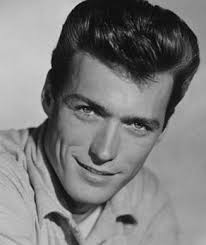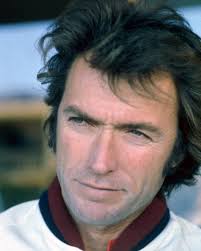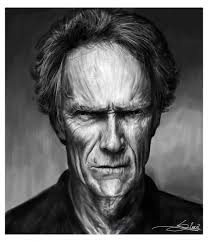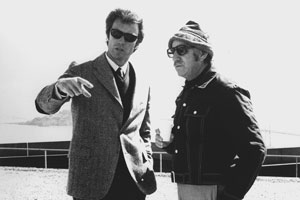Clint Eastwood is instantly recognizable to generations of movie fans as one of the most iconic actors of the past half century. From his first fame in '50s television to the international surprise hits of the Leone Spaghetti Westerns to Dirty Harry and beyond, Eastwood has remained one of the most popular movie stars of his time. It's a remarkable self-made career, excising himself from the throes of the old Studio System to become a complete filmmaker: first an independent producer, then a strong director. An improbable and wonderful journey.
When Eastwood entered the film business in the 1950s, there was very little one could do to guide their own career. You signed a long-term contract with the Studios, in Clint's case Universal, and they used you how they saw fit. For Clint that meant they used him hardly at all. After a few walk-on parts in B-movies and television shows, an unsatisfied Eastwood was unceremoniously released from his contract. But luck struck, and a chance meeting with a CBS executive landed him a co-staring role as the headstrong Rowdy Yates on
"Rawhide", which became a popular Western running for seven seasons and gave Eastwood his first taste of fame.
Still, breaking into films proved impossible and he found himself already typecast in most people's minds as the rather simple-minded Rowdy Yates. Even then Clint had ambitions to direct and repeatedly asked the producers if he could helm episodes of
"Rawhide". He was turned down every time, which is strange today because every single actor who wishes on any show that runs more than a couple years is almost automatically given the opportunity to get behind the camera. But this simply wasn't done in the '50s and '60s. So rather than retreat to his trailer, Eastwood studied the entire goings-on of a set, even though he never got his chance to try his hand at running the show.
He became a movie star, again by luck, when an unknown Italian director sent him a script, a bloody low-budget Western reworking of Akira Kurosawa's
Yojimbo to be shot in Spain, produced by Germans, and primarily cast with and helmed by Italians. The pay was very little, but being a fan of
Yojimbo and figuring if it was terrible nobody in America would ever see it anyway, Clint took a chance and signed on. Of course the movie was Leone's
A Fistful of Dollars which became an international hit, and by the time their third movie together (Clint still consciously learning about filmmaking all the while),
The Good, the Bad & the Ugly was released, Eastwood had even become a movie star in America.
Now he started to have some power over his career. The American Studios all wanted to work with him, and he crafted his own image, by forming a production company, naming it Malpaso - again, long before every single actor with a couple hits had their own production company. His second American post-Spaghetti feature was
Coogan's Bluff, which started a collaboration with another director Clint would learn much from, Don Siegel. In all Siegel would helm five movies starring Clint:
Coogan's Bluff, Two Mules for Sister Sara, The Beguiled, Escape From Alcatraz and
Dirty Harry. It was Harry Callahan who turned Clint from a star to a superstar, and while his post-Leone films had all had some measure of success, he was now finally able to take aim and ascend to the position he'd been eying since
"Rawhide": DIRECTOR.
The actor turned actor/producer was about to become an actor/producer/director, and by deferring his salary was allowed by Universal to direct
Play Misty for Me in 1971. It was an original screenplay Eastwood's company had been developing about a one-night stand gone horribly wrong when the woman becomes an obsessed, violent stalker. With nods to Hitchcock, a subversion of his own masculine image, and great performances by all involved (including Clint's mentor Don Siegel who has a fun cameo role), it was a commercial and critical success, but most importantly for Clint it proved beyond any doubt that he could indeed do it all.
Now the ambitious Eastwood was off, and over the rest of the '70s he quickly established himself in Hollywood as a reliable and economical filmmaker, always coming in on-time and at or even under-budget, with most of the movies showing healthy profits at the box-office. He knew where his bread was buttered, and repeatedly worked in the same kind of action genres that had made him a star in the first place. With the Westerns
High Plains Drifter and
The Outlaw Josey Wales and the actioners
The Eiger Sanction and
The Gauntlet, Clint directed himself in the kind of iconic roles people loved him for, but also very subtly expanding and playing with the audience expectations. He also made an effort to stretch himself as a filmmaker even then, and in
Breezy (1973), an underseen but solid romantic drama starring William Holden, Clint for the first time worked behind the camera exclusively. It was a modest little project that Universal was happy to let him do, as he was making so much money for them all the time.
Clint continued to act without directing too, but always using his Malpaso production power to shape the projects to his liking. Universal and Warner Brothers were the Studios where he was working, and eventually it was Warners that he would develop an exclusive relationship with - a relationship that still exists today.
While Clint was extremely successful now, always among the most popular movie stars year in and year out, his work as director was rather slow to be heralded critically or fully realized by fans. But Warners gave him free reign, agreeing to finance and distribute virtually anything Malpaso was interested in. In the '80s, Eastwood would play with his screen image even more, and as a director he became more and more accomplished. In films such as
Bronco Billy and
Honkytonk Man, Clint explored more adult less action-oriented material, and did it very well. These movies didn't become huge hits and were still confounding some critics - at least in America. In Europe, Clint's reputation as total filmmaker was secured around the time of
The Outlaw Josey Wales in 1976, and his less commercial work through the '80s was already being seen for what it was rather than what it wasn't. The American critical community at large was much slower in coming around. All too often they dismissed his work as popular genre junk, yet at the same time were left cold by the diversions from and subversions of genre he was orchestrating. But he was always the movie star, Warners was completely satisfied with their relationship, and he continued to wield the power he needed to make movies.
The American critics finally began to "get" Eastwood in 1988, when he made a minor masterpiece:
Bird. A bio-pic of legendary Jazz BeBop saxophonist Charlie "Yardbird" Parker who's drug addiction shortened his astounding career and caused turmoil in his personal life, Eastwood stayed behind the camera and really showed how much he had matured over the years as a filmmaker. A life-long devotee of Jazz music, Eastwood was a natural for the job. He had wanted to make the picture so much, he even talked Warner Brothers into trading one of their highly-touted and expensive scripts to Columbia to get his hands on Joel Olianansky's take on Parker's short and remarkable life (as a trivia note, the script that was traded was
Revenge, which eventually became the sweaty Tony Scott directed flop starring Kevin Costner).
Bird begins with a quote by F. Scott Fitzgerald: "There are no second acts in American lives." The self-destructive Charlie Parker rather proves that, but at the same time the accomplishment that
Bird is disproves it in regards to Eastwood. Now just shy of sixty, Eastwood was widely recognized as a total filmmaker, and he wasn't about to slow down.
Bird was one of the best received films at Cannes, winning the top acting prize for Forest Whitaker, who's central performances as Parker under Clint's guidance is a masterwork. Clint and the film itself narrowly missed the top prizes too (read screenwriter William Goldman's book
Hype & Glory for a recounting of that episode; Goldman sat on the Cannes jury that year). Whitaker and co-star Diane Venora both were nominated for Golden Globes for their work, and Eastwood
WON Best Director over such competition as Barry Levinson (
Rain Man), Alan Parker (
Mississippi Burning) and Mike Nichols (
Working Girl). But shamefully,
Bird and Eastwood were shut-out of that year's Oscars (though the film did rightfully win for it's revolutionary sound design).
Despite the Oscar disappointment, Eastwood had finally made his mark once and for all as a serious and multi-talented filmmaker, and over the next few years he would ascend to his highest peaks as an artist.
The underseen
White Hunter, Black Heart (1990) is a thinly-veiled recounting of John Huston in Africa to shoot
The African Queen...and, more importantly to him, shoot an elephant. It's a wonderful film, still waiting to be rediscovered. After a throwaway genre piece (
The Rookie), Clint took on what would become his true masterpiece:
Unforgiven. Eastwood had been aware of the original David Webb Peoples (
BladeRunner, 12 Monkeys) screenplay for years, had bought it and loved it in the early '80s but sat on it, deciding to wait and age into the lead role and then make his final cumulative statement on violence and Westerns - the genre that had made him everything he became. By 1991 at the age of sixty-one, Clint thought it was time. And was it ever!
Unforgiven is a perfect film in every single way, and Eastwood's assured direction ties every wonderful element together just right. From the acting to the photography to the sets to the music to the tone and pace, the total filmmaker achieves a total film. The last end credit acknowledges Eastwood's two strongest influences, "For Segio and Don" - of course being Sergio Leone and Don Siegel.
Unforgiven finally brought Clint respect and recognition as a director in every single possible arena, including the Academy, who named Eastwood Best Director and
Unforgiven Best Picture (as well as winning Best Supporting Actor for Gene Hackman, Best Editing for Joel Cox, and garnering nominations for Eastwood as Actor, Jack Green's cinematography, Henry Bumstead's set design, the screenplay and the sound design).
After the triumph of
Unforgiven, Clint made two more beautiful masterworks. The first is
A Perfect World (1993), where for the first time since
Where Eagles Dare and
Paint Your Wagon Clint took a supporting role and gave up top billing. One of my favorite movies, I think it is almost the equal of
Bird and
Unforgiven, but for whatever reason divided critics and never found an audience. It stars Kevin Costner, in what is far and away his best work as an actor, and young T.J. Lowther, a seven-year-old who had very little training. Costner's character Butch is an escaped convict in 1961 Texas, who kidnaps the young boy on his way. But Butch is a complicated haunted man, who has no intention of hurting the child, and in fact attempts to become the father figure neither one ever had - all the while being hunted down by Eastwood's sympathetic Texas Ranger. It's a beautiful movie with amazing performances, much too underappreciated.
Next was
The Bridges of Madison County, from the impossibly popular novella by Robert James Waller, a fictional love story about a National Geographic photographer who has a brief affair with an Iowa farm woman while on assignment to photograph the covered wooden bridges of the communtiy. A publishing sensation in the early '90s, it is truly an awful little book (trust me, I've read the flippin' thing), the soapiest of soap operas, with cardboard characters, cringe-inducing dialogue, and the sensibilty of a love-struck ten-year-old with the writing skills to match. Because of the off-the-charts popularity of this tripe, a film project was inevitable, and it was set to be directed by Steven Spielberg, starring Meryl Streep. Eastwood was approached to co-star in the film, and eventually Spielberg dropped out as director and Clint took over. Armed with a rather intelligent script by Richard LaGravenese (
The Fisher King) and bringing his own subtlty and sensibilty to the material, Eastwood and company remarkably truned a laughable piece of popular trash into an evocative and effective love story. It's really one of the most miraculous adaptations in the history of film, though seldom recognized as such. Don't let the book's reputation or the genre scare you off,
The Bridges of Madison County is an excellent movie well worth seeing. The climax of the movie, where Streep's character must make a difficult decision on a rainy afternoon, is a masterful scene.
One of the aspects I haven't mentioned about Eastwood the total filmmaker is his work as composer. He has composed themes and all-out scores for many of his pictures. It's probably most evident and impressive in
Unforgiven,
Million Dollar Baby and
The Bridges of Madison County, but he's been doing it, often uncredited, for years.
The '90s saw continued success for Eastwood, though never again reaching the total success level of
Unforgiven. As the century ended and Clint reached seventy-years of age, he moved back into a fun genre piece with
Space Cowboys, and had his biggest commercial hit in years. Despite moving back to the thriller genre,
Blood Work was a disappointment, but that was quickly erased. Moving back behind the camera again in 2003, Clint fashioned his biggest critical success since
Unforgiven with
Mystic River, a mystery/drama about the scars of abuse and the ruination of lives starring a powerhouse cast of Sean Penn, Tim Robbins and Kevin Bacon. It was nominated for six Academy Awards, including Best Picture and Best Director. Clint followed that up with an even greater success in
Million Dollar Baby. The story of a young female boxer with nothing to lose and the grizzled old trainer who takes her under his wing was a surprise hit and a surprisingly excellent film, the performances of Hilary Swank, Morgan Freeman and Clint himself elevating the material above the genre elements into something very moving and special. Clint's low-key directorial style was pitch-perfect, and the film was honored with seven Oscar noms. It won four awards, including Best Picture and a second Best Director for Eastwood (he became only the 18th multiple Oscar-winning director in the award's history).
Actors love the way Eastwood runs a set, as evidenced by the willingness of thespians from every generation to work with him, and all have nothing but respect and admiration for what he does. Now having helmed four of the last eight Oscar-winning acting performances (Penn & Robbins in
Mystic River and Swank & Freeman in
Million Dollar Baby) his stock as an actor's director has risen even higher.
He's starting to rack-up the career achievement type awards, too. In 1995 he received the honorary Irving G. Thalberg Memorial Award for his work as a producer, in 1996 he was named the honoree for the AFI's Life Achievement Award, in 1998 France's Honorary CÚsar for his work, and in 2006 the DGA gave him their Lifetime Achievement Award. Though Clint is hardly resting on his laurels. He's still very much at the top of his game as a filmmaker, and later this year will see an ambitious double release of two films made back to back with
Flags of Our Fathers and
Red Sun, Black Sand. The first is an adaptation of the non-fiction best seller recounting the young men who famously hoisted the American flag at the bloody Pacific Theatre WWII Battle of Iwo Jima. Rather than cast superstars, Clint and company went with mostly unknowns: Jesse Bradford, Adam Beach, Jamie Bell, Ryan Phillippe and Barry Pepper.
Red Sun, Black Sand will examine the same battle from the Japanese perspective and stars Ken Watanabe.
It took a long time, but Eastwood is now widely recognized as a total filmmaker - though even with all of his accomplishments he is still most readily identified for the iconic roles in Westerns and cop pictures that gave him the creative freedom he enjoys today. But take a long look at his filmography, watch a diverse selection of his work from the '70s to today, and you can't help but recognize him as one of the best filmmakers of the past thirty-plus years. And he ain't done yet.

 )
)






















